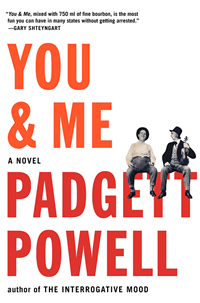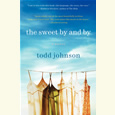All Woke Up and Nowhere to Go
The mad world of Padgett Powell’s You & Me can be frustrating, but it’s also playful and funny and oddly moving
In the tradition of great tragicomic, absurdist “buddy” narratives—Samuel Beckett’s Waiting for Godot, Tom Stoppard’s Rosencrantz and Guildenstern are Dead, any conversation between the Mad Hatter and the March Hare—Padgett Powell’s new novel, You & Me, takes the adventurous reader on a Toad’s Wild Ride of language. By turns angry, wistful, bitter, laugh-out-loud funny, pathetic, sweet, coarse, and tender, the book’s two companions indulge in a stream-of-consciousness dialogue that both confounds and enlightens.
You & Me opens with the following sentence: “Somewhere between Bakersfield, California, and Jacksonville, Florida—we think spiritually nearer the former and geographically nearer the latter—two weirdly agreeable dudes are on a porch in a not upscale neighborhood, apparently within walking distance of a liquor store, talking a lot.” That’s pretty much it for setting and description, since the entirety of the rest of the book consists of ninety-one short conversations between the two men. They are never named, and it is never clear which one of them is speaking. In fact, Powell does nothing to differentiate one from the other. The shortest of their conversations consists of three words: “Dude.” “What?” “Nothing.” The longest is only four and a half pages.
 You & Me reads more like a play than a novel; its prevailing mood is dissipation. The two men are stuck in an aimless, unsatisfying existence in which their chief occupation is to reflect on and discuss the state of their inhospitable environment, their disappointing pasts, and their own inadequacies. “Today we are becalmed, as we are daily becalmed,” says the first. “Every day we are becalmed,” answers the second. “Becalmed is our middle name,” responds the first.
You & Me reads more like a play than a novel; its prevailing mood is dissipation. The two men are stuck in an aimless, unsatisfying existence in which their chief occupation is to reflect on and discuss the state of their inhospitable environment, their disappointing pasts, and their own inadequacies. “Today we are becalmed, as we are daily becalmed,” says the first. “Every day we are becalmed,” answers the second. “Becalmed is our middle name,” responds the first.
Through the playfulness of their language, however, what ensues is often funny and occasionally strangely persuasive. These are men neither “burdened by purpose” nor “obliged by point.” Yet once fully entered into Powell’s mad world, the reader may be surprised to find how much their discussions begin to make a kind of loony sense. Consider the logic of the following as a philosophical position à la (one hopes) Jonathan Swift’s “A Modest Proposal”: “You can wrestle yourself to the ground weighing solicitations for you to contribute funds either to save an endangered paucity of animals or to feed an endangering surplus of starving people, who are the primary endangerment to the animals, but nowhere does anyone solicit funds from you to limit the numbers of the starving people.”
Sometimes they seem resigned to their fates as disaffected modern men: “We are fools to even try to be alive now”; “No one in his right mind would fight losing his mind”; “We were not sane men, but we were better than many.” Other conversations betray a longing for something more, something better than what they have become. “Where would you like to go?” one of the friends asks. The other answers with a particularly lyrical description of his own personal utopia: “I would like to go to a place where there are orange fields and sweet young dogs to walk in them with. There is a small wind at all times, large wind at night. Things bud and decay in equilibrium, light and shade play together nicely. If things are named, the names are known but not used overmuch. Forgetting and remembering have shaken hands.” Later they decide to “Live every day of our lives as if it’s the last day of our lives” or “LEDOOLAIITLDOOL” and then wonder whether it is not possible to go the liquor store in such a spirit.
Despair and disillusionment are never far away, though. “Were we born lazy or did we through industry of some kind, some noble force, get tired?” one asks. “That is the hopeful way to look at it,” his friend answers, “but I fear not. Why dispute it? Why struggle? A coward struggles to not admit he is lazy, or an ass, or a coward. There is bravery in surrender.” A nearby creek seems to them a mirror of their own lives: “its forlornness, its slightly iridescent stagnation, its unsupport of anything alive that one can see, its dubious mission, its helplessness, its pity, its bravery, the miracle of it withal in even remaining wet.” After a later, similarly dispiriting observation, they discuss the practicality of “blues insurance.” “Verification tricky. Who would not claim?” asks one. “Precisely,” replies the other.
Memories, dreams, history, and fantasy mingle in the men’s conversations, and twentieth-century pop-culture references abound, peopled by characters both real (Peter Jennings, Jesse Owens, Jerry Lewis, Judy Garland, Pat Boone, Julia Child, Ray Charles, Joe DiMaggio, Paul Newman, Jack Nicklaus) and imagined (Barney Fife; Howdy Doody; Juan Valdez; Tarzan and Jane; Dorothy, the Tin Man, and the Scarecrow). Just for fun, they concoct a tryst between Buster Brown and the Coppertone girl: “Her clothes are nearly already off. One can see Buster perhaps struggling to undo the eponymous brogans, comically, sitting on the ground in his short pants, little Miss Coppertone saying, Hurry up, Buster Brown, for God’s sake.”
 “We come up with things, here and there” says the first. “As would, I think we admit, monkeys at a typewriter, but still, we type,” responds the second. One of the characters imagines how spending time in the desert might affect them: “When you see a Gila monster emerge like a bizarre beaded purse you will love him as if he is your own mother. You will imprint on him as does a gosling on the first thing that it sees move and you will have a mother and not be sore afraid as you were even though they say your mother can kill you if you let her chew on you.” To which his friend replies, “God, in his infinite wisdom, has seen to it that our mothers do not chew on us when we are infants but wait until we are older and can take it.” It’s a long way to go for a joke, but the characters of You & Me are in no hurry. They seem to have all the time in the world.
“We come up with things, here and there” says the first. “As would, I think we admit, monkeys at a typewriter, but still, we type,” responds the second. One of the characters imagines how spending time in the desert might affect them: “When you see a Gila monster emerge like a bizarre beaded purse you will love him as if he is your own mother. You will imprint on him as does a gosling on the first thing that it sees move and you will have a mother and not be sore afraid as you were even though they say your mother can kill you if you let her chew on you.” To which his friend replies, “God, in his infinite wisdom, has seen to it that our mothers do not chew on us when we are infants but wait until we are older and can take it.” It’s a long way to go for a joke, but the characters of You & Me are in no hurry. They seem to have all the time in the world.
Or do they? Death is a continual topic between the two men, although they often approach it obliquely: “Will we ever be able to cross the river and rest in the shade of the trees, is what I am wondering,” one muses. They assert that modern society has found ways to protect itself from some historical dangers, such as disease, while simultaneously exposing itself to new, unanticipated ones, especially regarding the degradation of the natural environment. “We are living when before we would not have lived, and now we are dying where we would not have died.” “That is almost epitaphic,” his friend comments. “When he should have not, he lived. Where he should have not, he died.”
But what to do to fill all of those tedious hours until the end comes? “Well if a war doesn’t break out on you, and you don’t stumble into making money, and you can’t play ball, and women treat you wrong, or men, and you aren’t a movie star, and you don’t have any talent, and you aren’t smart, etc., what are you, we, supposed to do, exactly?” one asks. His friend answers, “Live until we die, without any more pondering than a dog, is my guess.” The first speaker congratulates him on his conclusion: “It’s a default position. It supports all dufus behavior.”
Padgett Powell will discuss You & Me at the twenty-fourth annual Southern Festival of Books, held October 12-14 at Legislative Plaza in Nashville. All events are free and open to the public.


